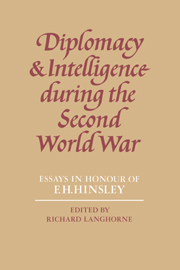Book contents
- Frontmatter
- Contents
- Contributors
- PART I
- PART II
- PART III
- 7 The political uses of military intelligence: evaluating the threat of a Jewish revolt against Britain during the Second World War
- 8 The politics of asylum, Juan Negrín and the British Government in 1940
- 9 Churchill and the British ‘Decision’ to fight on in 1940: right policy, wrong reasons
- 10 Britain and the Russian entry into the war
- 11 Crowning the revolution: the British, King Peter and the path to Tito's cave
- 12 Franklin Roosevelt and Unconditional Surrender
- PART IV
- Notes
- Bibliography of the writings of F. H. Kinsley
- Index
12 - Franklin Roosevelt and Unconditional Surrender
Published online by Cambridge University Press: 21 September 2009
- Frontmatter
- Contents
- Contributors
- PART I
- PART II
- PART III
- 7 The political uses of military intelligence: evaluating the threat of a Jewish revolt against Britain during the Second World War
- 8 The politics of asylum, Juan Negrín and the British Government in 1940
- 9 Churchill and the British ‘Decision’ to fight on in 1940: right policy, wrong reasons
- 10 Britain and the Russian entry into the war
- 11 Crowning the revolution: the British, King Peter and the path to Tito's cave
- 12 Franklin Roosevelt and Unconditional Surrender
- PART IV
- Notes
- Bibliography of the writings of F. H. Kinsley
- Index
Summary
The Allied demand for the unconditional surrender of the three major Axis powers during World War II, enunciated at Casablanca in January 1943, has not found much favour with diplomatic historians. With few exceptions they have found it unnecessary and unwise. For this there are two main reasons, one general and one more particular. First, a demand so bald and absolute offends against a belief still dominant among those who are, after all, students of negotiation – that room should always be left for negotiation. In one standard account Professor Michael Howard pronounced the magisterial judgment that ‘the announcement was made without any of the forethought and careful consideration which should have gone to the framing of so major an act of Allied policy’. And, after elaborating a little, he concludes, ‘Had it been otherwise, the Allied leaders might have reflected a little more deeply on the question, whether total victory is necessarily the surest foundation for a lasting peace.’ Second, much of the formative writing on the subject was by men who had experience of trying to translate the doctrine into practical terms, whether during the war or in its immediate aftermath. They were conscious of many difficulties and ready to suppose that different policies would have lessened them.
- Type
- Chapter
- Information
- Diplomacy and Intelligence During the Second World WarEssays in Honour of F. H. Hinsley, pp. 219 - 242Publisher: Cambridge University PressPrint publication year: 1985
- 3
- Cited by



